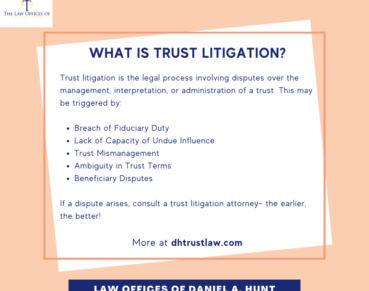A Guide to Executor Fraud in California
The decedent’s will decides how a person’s estate will be distributed—additionally, most wills state who will be in charge of managing the process of distributing the estate to beneficiaries or heirs. Typically, a person will appoint a spouse, child, or trusted family member to act as the estate’s executor. However, in many cases, years pass between writing a will and the person’s death. The person named as the executor may have stopped getting along with the rest of the family. Or they may not live up to their expectations of diligence, competence, or integrity. Here is a guide to executor fraud in California.
Do You Suspect Fraud on the Part of the Executor?
Estate executors have a fiduciary duty to manage and distribute the estate for the benefit of the beneficiaries. Unfortunately, some estate executors engage in mismanagement. They may unlawfully obtain assets, money, or other benefits from managing the estate. When an estate executor engages in an unscrupulous activity, they are engaging in executor fraud.
If you suspect that an executor has engaged in fraud or mismanaged your loved one’s estate, you have several legal options. Under California law, a probate court will authorize the removal of an executor when they:
- Have mismanaged, embezzled, or wasted estate assets
- Misappropriating funds or other assets
- Withholding inheritances
- Hiding or omitting estate assets
- Lying about estate assets
- Underpaying a beneficiary of the will
- Falsifying liabilities
- Charging inflated executor fees
- Selling estate assets for a price that is below market value to a relative or friend
- Has committed fraud or plans to do so
- Is unqualified or incapable to execute the duties
- Fails to act or is negligent, or
- For any other reason authorized by the law
Estate Executors Must Provide Beneficiaries With Proper Accounting
Under California law, executors of a will must file an accounting of all of the transactions they have conducted while administering the estate. The executor must file this accounting with the probate court. Upon completing the estate administration, the executor must file an accounting with the court that summarizes the financial activity that has happened since the probate process began.
The accounting must have specificity, and the executor has a duty to maintain records to substantiate the estate transactions. When beneficiaries ask to inspect and review the transactions, the executor must have them readily available. All accountancy provided to the executor must include:
- The initial inventory of the estate property
- The value of any assets received by the estate during the accounting period
- The net business income and losses of the estate
- Sales gains and losses of the estate
- The amount of disbursements, including distributions to the beneficiaries
When an executor fails to provide a proper accounting or does not provide all of the required assets, the beneficiaries have a right to submit a petition for an accounting. As a result, the executor will be required to provide a detailed accounting report of all of the assets that have moved in and out of the estate. If you discover evidence of theft, you can file a personal injury lawsuit against the executor in civil court. Probate accountings can be falsified, and you may need the assistance of an accountant to examine the accounts to look for evidence of fraud. The probate court may decide to remove the executor as a result of your petition.
What to Do if You Suspect Fraud
If you are a beneficiary who suspects fraud, you should begin collecting evidence of the estate executor’s misconduct. An estate litigation lawyer can assist you in filing a petition with the probate court. The court will order the executor to abide by the dispositions of the will and correct the situation by a specific deadline if they agree with your claim. If the executor does not comply, the court may appoint a new executor or agree to a new executor that the beneficiaries or heirs propose.
Beneficiaries Can Sue the Executor Personally for Fraud
In California, an executor can be sued for fraud, just like anybody else. Suppose an executor commits fraud against an estate. In that case, the people who suffered a loss due to the fraud can initiate a lawsuit against the executor for fraud or any other causes of action. The court can remove an executor as the personal representative of the estate for committing fraud. Any interested person can petition a California probate court to remove the personal representative from office if they have embezzled, mismanaged, wasted, or committed fraud on the estate, or are about to do so.
What to Do if You Have Been Accused of Executor Fraud
If you have been accused of executor fraud, you must take action as soon as possible to defend yourself. When a beneficiary pursues legal action against you through a lawsuit, you could be removed as the executor. You could also face personal liability, meaning the beneficiary could obtain a judgment against you personally. If you do not defend yourself, the beneficiary could obtain a default judgment, forcing you to pay even if the charges are baseless. We recommend discussing your case with an experienced estate litigation lawyer as soon as possible.
Discuss Your Case With an Estate Litigation Lawyer
Are you concerned that the executor of your loved one’s estate is engaged in fraud or mismanagement? If so, you may have a right to take legal action to remove the executor. At the Law Office of Daniel Hunt, our experienced estate litigation lawyers can help you determine your best course of action. We have successfully represented many Sacramento-area clients in matters involving executor fraud. Whether you have been accused of fraud as an executor or you would like to file a fraud petition, we can help. If you have any questions about this guide to executor fraud in California, contact our law firm today to schedule your initial consultation to learn more about our legal services.
Law Offices of Daniel A. Hunt
The Law Offices of Daniel A. Hunt is a California law firm specializing in Estate Planning; Trust Administration & Litigation; Probate; and Conservatorships. We've helped over 10,000 clients find peace of mind. We serve clients throughout the greater Sacramento region and the state of California.




